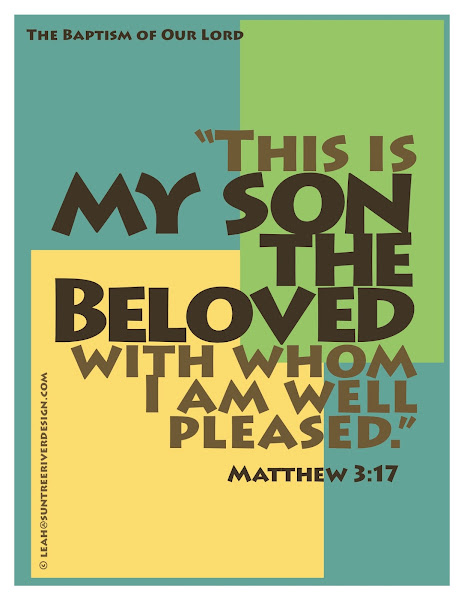
Matthew 3:13-17
13 Then Jesus came from Galilee to John at the Jordan, to be baptized by him. 14 John would have prevented him, saying, "I need to be baptized by you, and do you come to me?" 15 But Jesus answered him, "Let it be so now; for it is proper for us in this way to fulfill all righteousness." Then John consented.
16 And when Jesus had been baptized, just as he came up from the water, suddenly the heavens were opened to him and he saw the Spirit of God descending like a dove and alighting on him. 17 And a voice from heaven said, "This is my Son, the Beloved, with whom I am well pleased."
A New Creation
With a Book of Beginnings, Book of Origins = biblios geneseos, Matthew presents a new Genesis, a New Creation with Jesus of Nazareth's birth, life, death, resurrection, and ascension. When Matthew's gospel concludes, Jesus charges us to go into all the world, make disciples, baptize and teach them.
• For Matthew's lectionary year I blogged a short overview.
The Season of Epiphany
In the wake of the Day of Epiphany, this season of varying lengths ends with Transfiguration (in Western protestant churches). "Different lengths" because Lent comes after Epiphany, and the date of Ash Wednesday depends on the date of Easter.
During Epiphany that reveals, manifests, and makes apparent the presence of the Divine, we learn about Jesus' early ministry. In all four gospels we find Jesus' cousin John baptizing Jesus. Although it was not our trinitarian baptism but more of a fresh start for the entire people, baptism initiated Jesus' public ministry, just as it does ours. Jesus' ministry shows and clarifies God's love and purpose for creation; Jesus invites us to follow him to be God's presence in the world.
Jesus' Baptism
We find John baptizing Jesus in all four gospels, so listen up! Next week in John's gospel [1:29] we'll hear John the Baptist identifying Jesus as "the Lamb of God, who takes away the sins of the world."
Jesus' baptism often is identified as a trinitarian theophany, a revelation of all three persons of the Trinity.
Somewhat related to John the Baptist wondering why Jesus would need baptism brings at least one aspect of our Christian baptismal theology into this text. First, John's baptism was a new beginning for the nation of Israel more than it was for the individual being dunked, although an individual always belongs to a greater whole. Also, when Matthew's community assembled their account, questions of Jesus' full divinity weren't yet a thing; those concerns unfolded two or three centuries later. In terms of formal doctrine, the Definition of Chalcedon that describes Jesus Christ as fully human, completely divine, dates from 451. Yet again, all four gospels refer to Jesus as divine, son of God, God with us, pre-existent Word/speech/action of God, one with the Father.
Jesus himself answered John's objections by explaining he needed to be baptized in order "to fulfill all righteousness." In scriptural terms, to be righteous means to be aligned with God, in literal right relationship, to act with justice. "Thy kingdom come" is a righteous prayer; a righteous desire sidesteps human whims for the deeper, broader connectional fulfillment that helps lead to heaven on earth.
Our Baptism
This Jesus-Savior, Emmanuel-God-with-us would save the people from their sins. Jesus' cousin John identifies him as Lamb of God, who takes away the sins of the world. In that culture debt and sin were close to synonymous, thus all the biblical calls for and actions toward distributive justice, yet sin also was about shortcomings the Westminster Catechism describes as "lack of conformity unto or transgression of the law of God." Because in some ways John's baptism of Jesus was closer to the repeatable ritual bath or mikvah than to our Trinitarian baptism into Jesus' death and resurrection, comparisons can get tricky, but let's go for it, anyway.
Jesus came up from the water, the heavens opened and he saw the Spirit of God descending like a dove … And a voice from heaven said, "This is my Son, the Beloved."
Jesus sends his followers into the world to baptize and teach; somehow most people reading this blog have been baptized, taught, and agreed to follow Jesus.
A New Creation
Comparing Jesus' baptism to ours can put us into a precarious position; interpreting Jesus as Isaiah's suffering servant may not be historically warranted—although Holy Week scriptures do exactly that. But notice the insight of the lectionary committee in appointing this Second Isaiah [chapters 40-55] passage with God's announcement of Jesus' divine sonship alongside the waters of new birth:
Isaiah 42:1,9Jesus conception and birth are the start of the new creation? Yes! But Jesus' baptism opens an ongoing visible, public, manifestation or showing-forth of God's new action in recreating the world. As Jesus came up from the water, the heavens opened and he saw the Spirit. Did this echo the first creation as it emerged from surging disarray into boundaries, purpose, and intent? Did it replicate Israel showing up wet on the other side after crossing the Jordan into the promised land of covenanted community, agricultural bounty, and grace?
1 Here is my servant, whom I uphold,
my chosen, in whom my soul delights;
I have put my spirit upon him;
he will bring forth justice to the nations.
9 See, the former things have come to pass,
and new things I now declare;
before they spring forth,
I tell you of them.
How about us? Our baptism initiates our public ministry. Jesus' ministry shows and clarifies God's love and purpose for creation. Jesus invites us to follow him into the waters, into the world…
No comments:
Post a Comment